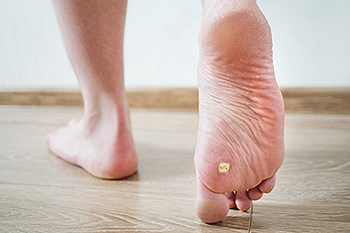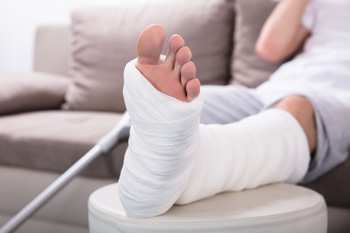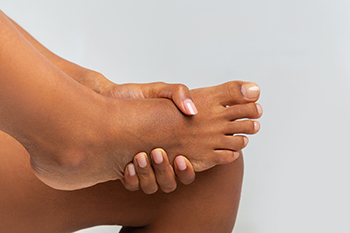Douglas Pacaccio, DPM
Thomas Nordquist, DPM
August 2021
Signs of a Broken Foot
A foot fracture occurs when one or more of the bones in the foot breaks. This is often due to either a sudden injury or small, repetitive stress injuries to the bones over time. Signs of a broken foot bone include pain that increases upon standing or walking, tenderness, swelling, bruising, numbness, a cracking sound when moving the foot, and an abnormal foot shape. In very severe, open fractures, bits of broken bone may break through the skin and require emergency care. If you suspect that you have broken a bone in your foot, it is strongly suggested that you seek the care of a podiatrist. The podiatrist will be able to diagnose the fracture, determine the extent of the injury, and offer treatments to help you fully recover.
A broken foot requires immediate medical attention and treatment. If you need your feet checked, contact one of our podiatrists from Advanced Foot and Ankle Surgeons, Inc. . Our doctors can provide the care you need to keep you pain-free and on your feet.
Broken Foot Causes, Symptoms, and Treatment
A broken foot is caused by one of the bones in the foot typically breaking when bended, crushed, or stretched beyond its natural capabilities. Usually the location of the fracture indicates how the break occurred, whether it was through an object, fall, or any other type of injury.
Common Symptoms of Broken Feet:
- Bruising
- Pain
- Redness
- Swelling
- Blue in color
- Numbness
- Cold
- Misshapen
- Cuts
- Deformities
Those that suspect they have a broken foot shoot seek urgent medical attention where a medical professional could diagnose the severity.
Treatment for broken bones varies depending on the cause, severity and location. Some will require the use of splints, casts or crutches while others could even involve surgery to repair the broken bones. Personal care includes the use of ice and keeping the foot stabilized and elevated.
If you have any questions please feel free to contact one of our offices located in Sycamore, and Yorkville, IL . We offer the newest diagnostic and treatment technologies for all your foot and ankle needs.
Understanding Warts on the Feet
 A verruca is a small wart on the sole of the foot. They are more commonly known as plantar warts. Plantar warts can grow on the sole of the foot because of the human papillomavirus (HPV). This virus is contagious and thrives in warm and moist environments like locker rooms and swimming pools which makes plantar warts common for people who are barefoot in these communal areas. Plantar warts are not usually painful unless they are bearing weight. Some patients have found they may be tender to the touch as well. To avoid the spread of plantar warts, you should wear flip flops in communal areas such as pools, locker rooms, or showers. If you have a plantar wart that persists, consulting with a podiatrist and getting professional advice can be extremely beneficial.
A verruca is a small wart on the sole of the foot. They are more commonly known as plantar warts. Plantar warts can grow on the sole of the foot because of the human papillomavirus (HPV). This virus is contagious and thrives in warm and moist environments like locker rooms and swimming pools which makes plantar warts common for people who are barefoot in these communal areas. Plantar warts are not usually painful unless they are bearing weight. Some patients have found they may be tender to the touch as well. To avoid the spread of plantar warts, you should wear flip flops in communal areas such as pools, locker rooms, or showers. If you have a plantar wart that persists, consulting with a podiatrist and getting professional advice can be extremely beneficial.
Plantar warts can be very uncomfortable. If you need your feet checked, contact one of our podiatrists from Advanced Foot and Ankle Surgeons, Inc. . Our doctors will assist you with all of your foot and ankle needs.
About Plantar Warts
Plantar warts are the result of HPV, or human papillomavirus, getting into open wounds on the feet. They are mostly found on the heels or balls of the feet.
While plantar warts are generally harmless, those experiencing excessive pain or those suffering from diabetes or a compromised immune system require immediate medical care. Plantar warts are easily diagnosed, usually through scraping off a bit of rough skin or by getting a biopsy.
Symptoms
- Lesions on the bottom of your feet, usually rough and grainy
- Hard or thick callused spots
- Wart seeds, which are small clotted blood vessels that look like little black spots
- Pain, discomfort, or tenderness of your feet when walking or standing
Treatment
- Freezing
- Electric tool removal
- Laser Treatment
- Topical Creams (prescription only)
- Over-the-counter medications
To help prevent developing plantar warts, avoid walking barefoot over abrasive surfaces that can cause cuts or wounds for HPV to get into. Avoiding direct contact with other warts, as well as not picking or rubbing existing warts, can help prevent the further spread of plantar warts. However, if you think you have developed plantar warts, speak to your podiatrist. He or she can diagnose the warts on your feet and recommend the appropriate treatment options.
If you have any questions please feel free to contact one of our offices located in Sycamore, and Yorkville, IL . We offer the newest diagnostic and treatment technologies for all your foot and ankle needs.
Experiencing Foot Pain During the Night
There are several different reasons why many patients experience foot pain during the night. One common cause can be due to plantar fasciitis, where pain in the heel can be felt in the morning after arising, as well as felt during the night. Inflammation can often accompany the condition known as Morton’s neuroma, and burning, shooting pain may be present in the toes during the night. The central nervous system can become compromised with existing diabetes, and nerve pain or tingling in the feet may also be present at night. A chronic condition referred to as fibromyalgia can cause pain and stiffness in the feet, and this may become worse at night because of low levels of the hormone cortisol. If you have foot pain that may worsen at night, it is suggested that you consult with a podiatrist who can effectively diagnose and treat your condition.
Foot Pain
Foot pain can be extremely painful and debilitating. If you have a foot pain, consult with one of our podiatrists from Advanced Foot and Ankle Surgeons, Inc. . Our doctors will assess your condition and provide you with quality foot and ankle treatment.
Causes
Foot pain is a very broad condition that could be caused by one or more ailments. The most common include:
- Bunions
- Hammertoes
- Plantar Fasciitis
- Bone Spurs
- Corns
- Tarsal Tunnel Syndrome
- Ingrown Toenails
- Arthritis (such as Gout, Rheumatoid, and Osteoarthritis)
- Flat Feet
- Injury (from stress fractures, broken toe, foot, ankle, Achilles tendon ruptures, and sprains)
- And more
Diagnosis
To figure out the cause of foot pain, podiatrists utilize several different methods. This can range from simple visual inspections and sensation tests to X-rays and MRI scans. Prior medical history, family medical history, and any recent physical traumatic events will all be taken into consideration for a proper diagnosis.
Treatment
Treatment depends upon the cause of the foot pain. Whether it is resting, staying off the foot, or having surgery; podiatrists have a number of treatment options available for foot pain.
If you have any questions, please feel free to contact one of our offices located in Sycamore, and Yorkville, IL . We offer the newest diagnostic and treatment technologies for all your foot care needs.
Plantar Warts Can Be Treated!
Can Falling Be Prevented?
 Falling is a major cause of hospital stays for people who are age sixty-five and older. They can encounter serious foot conditions, and can make accomplishing daily activities difficult to achieve. Additionally, a fear of falling may invoke a loss of independence, following spending several days in the hospital. The group of people who are at risk can include patients who wear shoes that do not fit correctly, have a vitamin D deficiency, or who have mobility and balance issues. It is beneficial to repair hazardous conditions in the household, which can consist of removing worn rugs, and installing grab bars in the shower and toilet area. It can help to maintain regular physical examinations that can monitor vision and blood pressure. If you would like more information about how to protect the feet and prevent falling, please consult with a podiatrist.
Falling is a major cause of hospital stays for people who are age sixty-five and older. They can encounter serious foot conditions, and can make accomplishing daily activities difficult to achieve. Additionally, a fear of falling may invoke a loss of independence, following spending several days in the hospital. The group of people who are at risk can include patients who wear shoes that do not fit correctly, have a vitamin D deficiency, or who have mobility and balance issues. It is beneficial to repair hazardous conditions in the household, which can consist of removing worn rugs, and installing grab bars in the shower and toilet area. It can help to maintain regular physical examinations that can monitor vision and blood pressure. If you would like more information about how to protect the feet and prevent falling, please consult with a podiatrist.
Preventing falls among the elderly is very important. If you are older and have fallen or fear that you are prone to falling, consult with one of our podiatrists from Advanced Foot and Ankle Surgeons, Inc. . Our doctors will assess your condition and provide you with quality advice and care.
Every 11 seconds, an elderly American is being treated in an emergency room for a fall related injury. Falls are the leading cause of head and hip injuries for those 65 and older. Due to decreases in strength, balance, senses, and lack of awareness, elderly persons are very susceptible to falling. Thankfully, there are a number of things older persons can do to prevent falls.
How to Prevent Falls
Some effective methods that older persons can do to prevent falls include:
- Enrolling in strength and balance exercise program to increase balance and strength
- Periodically having your sight and hearing checked
- Discuss any medications you have with a doctor to see if it increases the risk of falling
- Clearing the house of falling hazards and installing devices like grab bars and railings
- Utilizing a walker or cane
- Wearing shoes that provide good support and cushioning
- Talking to family members about falling and increasing awareness
Falling can be a traumatic and embarrassing experience for elderly persons; this can make them less willing to leave the house, and less willing to talk to someone about their fears of falling. Doing such things, however, will increase the likelihood of tripping or losing one’s balance. Knowing the causes of falling and how to prevent them is the best way to mitigate the risk of serious injury.
If you have any questions, please feel free to contact one of our offices located in Sycamore, and Yorkville, IL . We offer the newest diagnostic and treatment technologies for all your foot care needs.
Read more about Falls PreventionWhat Does the Achilles Tendon Do?
 The Achilles tendon is a fibrous band of tissue that connects your calf muscles to your heel bones. This important tendon plays a major role in walking, running, and climbing up stairs by transmitting power from the calf muscles to the foot. The Achilles tendon also allows the foot to be flexed. When the Achilles tendon is injured, symptoms such as pain, swelling, and difficulty walking usually follow. An Achilles tendon rupture, which is a full tearing of the tendon, can be extremely painful and greatly reduce one’s mobility. If you are experiencing any pain in your calves or heels, this may be indicative of an Achilles tendon injury, and it is suggested that you schedule an appointment with a podiatrist near you.
The Achilles tendon is a fibrous band of tissue that connects your calf muscles to your heel bones. This important tendon plays a major role in walking, running, and climbing up stairs by transmitting power from the calf muscles to the foot. The Achilles tendon also allows the foot to be flexed. When the Achilles tendon is injured, symptoms such as pain, swelling, and difficulty walking usually follow. An Achilles tendon rupture, which is a full tearing of the tendon, can be extremely painful and greatly reduce one’s mobility. If you are experiencing any pain in your calves or heels, this may be indicative of an Achilles tendon injury, and it is suggested that you schedule an appointment with a podiatrist near you.
Achilles tendon injuries need immediate attention to avoid future complications. If you have any concerns, contact one of our podiatrists of Advanced Foot and Ankle Surgeons, Inc. . Our doctors can provide the care you need to keep you pain-free and on your feet.
What Is the Achilles Tendon?
The Achilles tendon is a tendon that connects the lower leg muscles and calf to the heel of the foot. It is the strongest tendon in the human body and is essential for making movement possible. Because this tendon is such an integral part of the body, any injuries to it can create immense difficulties and should immediately be presented to a doctor.
What Are the Symptoms of an Achilles Tendon Injury?
There are various types of injuries that can affect the Achilles tendon. The two most common injuries are Achilles tendinitis and ruptures of the tendon.
Achilles Tendinitis Symptoms
- Inflammation
- Dull to severe pain
- Increased blood flow to the tendon
- Thickening of the tendon
Rupture Symptoms
- Extreme pain and swelling in the foot
- Total immobility
Treatment and Prevention
Achilles tendon injuries are diagnosed by a thorough physical evaluation, which can include an MRI. Treatment involves rest, physical therapy, and in some cases, surgery. However, various preventative measures can be taken to avoid these injuries, such as:
- Thorough stretching of the tendon before and after exercise
- Strengthening exercises like calf raises, squats, leg curls, leg extensions, leg raises, lunges, and leg presses
If you have any questions please feel free to contact one of our offices located in Sycamore, and Yorkville, IL . We offer the newest diagnostic tools and technology to treat your foot and ankle needs.
Blog Archives
- July 2024
- June 2024
- May 2024
- April 2024
- March 2024
- February 2024
- January 2024
- December 2023
- November 2023
- October 2023
- September 2023
- August 2023
- July 2023
- June 2023
- May 2023
- April 2023
- March 2023
- February 2023
- January 2023
- December 2022
- November 2022
- October 2022
- September 2022
- August 2022
- July 2022
- June 2022
- May 2022
- April 2022
- March 2022
- February 2022
- January 2022
- December 2021
- November 2021
- October 2021
- September 2021
- August 2021
- July 2021
- June 2021
- May 2021
- April 2021
- March 2021
- February 2021
- January 2021
- December 2020
- November 2020
- October 2020
- September 2020
- August 2020
- July 2020
- June 2020
- May 2020
- April 2020
- March 2020
- February 2020
- January 2020
- December 2019
- November 2019
- October 2019
- September 2019
- August 2019
- July 2019
- June 2019
- May 2019
- April 2019
- March 2019
- February 2019
- January 2019
- December 2018
- November 2018
- October 2018
- September 2018











